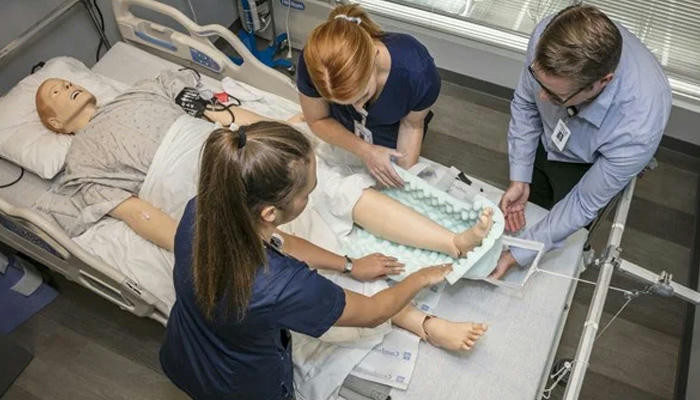Top Free Certifications for Nurses: Boost Your Skills Without Spending a Dime

Great news for nurses looking to enhance their skills without breaking the bank: there are free certifications available that can help you advance your career! Yes, you read that right—these opportunities cost nothing at all.
In an industry where continuous learning is essential, finding free educational resources can be a game-changer. Whether you're managing student loans or planning for retirement, these no-cost certifications offer a chance to grow professionally without the financial burden.
Here’s a guide to some valuable free certifications that can enrich your nursing practice and keep you up-to-date with the latest in healthcare.
Why Earning Certifications is Essential for Nurses
In the dynamic field of healthcare, keeping your skills and knowledge up-to-date is essential. Here’s a closer look at why pursuing certifications can be beneficial for nurses:
1.Enhance Your Skills and Tools:
Stay Current with Technology: Healthcare technology advances rapidly, and new tools and techniques are continually being developed. Certifications often cover the latest technologies and practices, helping you integrate them into your work to improve patient care.
Improve Patient Outcomes: Advanced certifications can provide deeper insights into complex conditions and innovative treatment methods. This knowledge helps you offer more accurate diagnoses and effective treatments, directly benefiting your patients’ health and recovery.
Adapt to New Research: Medical research frequently introduces new findings and guidelines. Certifications keep you informed about the latest evidence-based practices, allowing you to apply cutting-edge knowledge in your daily care routines.

2.Boost Your Resume:
Stand Out to Employers: In a competitive job market, having additional certifications can make your resume stand out. It signals to potential employers that you are committed to ongoing professional development and excellence in patient care.
Open New Career Opportunities: Certain specialized roles or advanced positions may require specific certifications. By obtaining these credentials, you can qualify for a wider range of job opportunities and advance your career in desired directions.
Demonstrate Dedication: Certifications show that you are proactive about your career and invested in your role as a nurse. They reflect your dedication to mastering your field and improving your practice, which can be appealing to both current and future employers.
3.Keep Your Knowledge Up-to-Date:
Maintain Sharp Skills: Even if you’ve been in the field for years, continuing education ensures that your skills remain sharp. Regular learning helps you stay proficient in areas you don’t frequently use, so you’re always prepared for any situation.
Adapt to Changes in Healthcare: The medical field is constantly evolving with new treatments, guidelines, and practices. Ongoing certification helps you keep pace with these changes, ensuring that your knowledge and skills remain relevant.
Increase Confidence: Knowing that you are up-to-date with the latest practices and guidelines boosts your confidence in handling various clinical scenarios. This confidence translates into better patient care and enhanced job performance.

By pursuing certifications, you not only advance your career but also contribute positively to patient care and healthcare practices.
Top Free Courses and Certifications for Nurses
When considering continuing education, cost is just one factor. Time and balance are also crucial. As a nurse, you juggle long shifts and personal well-being, so finding flexible, self-paced courses is key. Here are some excellent free courses and certifications designed for busy professionals like you:
Health After Cancer: Cancer Survivorship for Primary Care
Offered by Stanford University on Coursera, this course is invaluable for those interacting with cancer survivors. It focuses on improving communication with oncology patients and developing effective prevention and care plans. The course aims to enhance your skills in addressing the unique needs of cancer survivors, helping you provide more compassionate and informed care.
Essentials of Palliative Care
Also from Stanford on Coursera, this course covers the basics of palliative care. It teaches empathetic communication techniques and psychological support strategies. This is ideal for nurses looking to improve their ability to provide comfort and support to patients with serious illnesses, focusing on both the emotional and practical aspects of care.
Neuromuscular Monitoring Course
Available through edX and provided by Stanford, this self-paced course is tailored for anesthesia professionals. It delves into neuromuscular monitoring equipment and interventions, offering a deep dive into the technical aspects of anesthesia care. This course helps enhance your expertise in managing neuromuscular function during surgery.
Knowledge and Skills for Dementia Care: The SSLD Approach
This Coursera course from the University of Toronto provides a comprehensive look at dementia care. It uses the Strategies and Skills Learning and Development (SSLD) approach to offer practical techniques for managing dementia symptoms in community, long-term, and home care settings. Ideal for nurses working with dementia patients, it focuses on effective care strategies and skill development.

Nursing and Long-term Conditions
Offered by Coventry University via FutureLearn, this course helps registered nurses understand and manage long-term conditions. It explains national contexts and provides strategies to help patients avoid and manage chronic illnesses. This course is useful for those looking to expand their knowledge of chronic disease management and preventative care.
Diet Therapy
Alison offers this online course, which follows the "let food be thy medicine" philosophy. It teaches how nurses can guide patients in modifying their diets to manage gastrointestinal conditions and combat diseases. This course provides practical dietary advice to support patient health through nutritional changes.
Training for Nurses on Shift Work & Long Hours
This course from the CDC focuses on self-care for nurses. It addresses the challenges of working long hours and provides strategies to mitigate associated risks. It's essential for maintaining your own health and well-being, ensuring you can continue to deliver high-quality patient care while managing the demands of shift work.
Nursing Home Infection Preventionist Training Course
Another offering from the CDC, this course is designed for nurses in infection control roles. It covers strategies to prevent the spread of infections in nursing home settings, providing critical knowledge for managing and mitigating infection risks among vulnerable populations.
Pediatric HIV Nursing
ColumbiaX offers this course, which focuses on the care of children and adolescents with HIV. It covers diagnosis, treatment, and psychological support, offering a comprehensive approach to managing HIV in young patients. This course is ideal for those involved in pediatric care, enhancing your ability to support and treat children with HIV.
Patient Safety and Quality Improvement: Developing a Systems View
Provided by Johns Hopkins University on Coursera, this course explores the history and principles of patient safety and quality improvement. It emphasizes developing a systems approach to create high-reliability organizations. This course is valuable for nurses interested in enhancing patient safety and quality management practices in healthcare settings.
How to Choose the Best Nursing Course for You

When selecting a nursing course, balancing time and budget is crucial. Here are some tips to help you find the right course that fits your needs and goals:
Determine Your Career Goals
Career Advancement: If you’re aiming for a higher role in nursing or want to enhance your resume, make sure the course offers the certification or credential you’re looking for. Some courses might require a fee but provide valuable qualifications.
Skill Development: Consider what specific skills or knowledge you want to gain. Whether it's a new specialty or advanced techniques, choose a course that aligns with your career aspirations.
Read Course Reviews
Check Feedback: Look for reviews and ratings from past students. Reviews can give you insights into the course’s quality, content, and overall effectiveness. Pay attention to both positive and negative feedback to get a balanced view.
Evaluate Pros and Cons: Assess the advantages and potential drawbacks of the course based on what others have experienced. This can help you make a more informed decision.
Consider Your Interest in the Subject
Engagement: If the course topic excites you, you’re more likely to stay motivated and engaged. Choose a subject that genuinely interests you, as this will make learning more enjoyable and effective.
Career Fit: If you’re not passionate about the course topic but need it for career advancement, think about whether a different specialization might be a better fit. Nursing offers numerous specialties, so you can explore various paths without starting from scratch.

Think About Your Schedule
Time Commitment: Evaluate how much time you can realistically dedicate to the course. Some courses are self-paced, allowing you to fit study around your work schedule, while others may have fixed deadlines.
Balancing Work and Study: Ensure you have a manageable study plan that doesn’t overwhelm your work and personal life.
Assess Course Content and Format
Content Depth: Make sure the course covers the material you need in sufficient depth. Some courses provide a broad overview, while others offer in-depth exploration of specific topics.
Learning Style: Choose a course format that suits your learning style, whether it’s interactive online modules, video lectures, or hands-on practice.
Final Thoughts
Education is a valuable tool that never loses its worth. Whether you’re just starting out in nursing or looking to enhance your existing skills, staying informed and continually learning will always benefit you. Even if you don’t decide to specialize, the knowledge you gain will be useful throughout your career.
We hope this guide to free certifications helps you build a strong foundation in your nursing career.
